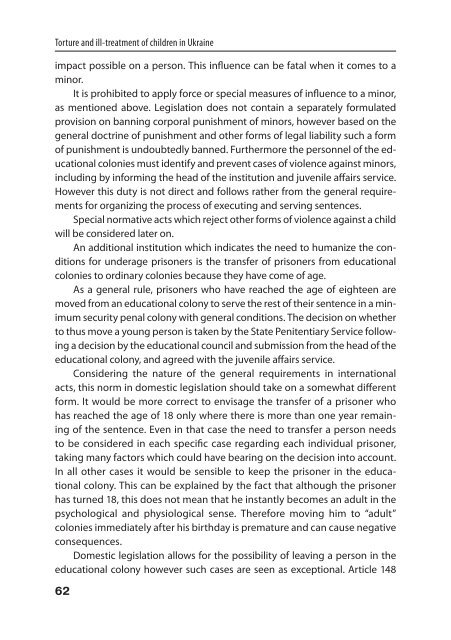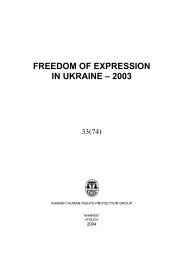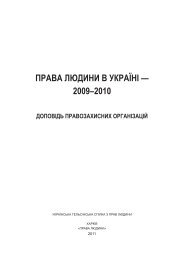TORTURE AND ILL-TREATMENT OF CHILDREN IN UKRAINE
TORTURE AND ILL-TREATMENT OF CHILDREN IN UKRAINE
TORTURE AND ILL-TREATMENT OF CHILDREN IN UKRAINE
- No tags were found...
You also want an ePaper? Increase the reach of your titles
YUMPU automatically turns print PDFs into web optimized ePapers that Google loves.
Torture and ill-treatment of children in Ukraineimpact possible on a person. This influence can be fatal when it comes to aminor.It is prohibited to apply force or special measures of influence to a minor,as mentioned above. Legislation does not contain a separately formulatedprovision on banning corporal punishment of minors, however based on thegeneral doctrine of punishment and other forms of legal liability such a formof punishment is undoubtedly banned. Furthermore the personnel of the educationalcolonies must identify and prevent cases of violence against minors,including by informing the head of the institution and juvenile affairs service.However this duty is not direct and follows rather from the general requirementsfor organizing the process of executing and serving sentences.Special normative acts which reject other forms of violence against a childwill be considered later on.An additional institution which indicates the need to humanize the conditionsfor underage prisoners is the transfer of prisoners from educationalcolonies to ordinary colonies because they have come of age.As a general rule, prisoners who have reached the age of eighteen aremoved from an educational colony to serve the rest of their sentence in a minimumsecurity penal colony with general conditions. The decision on whetherto thus move a young person is taken by the State Penitentiary Service followinga decision by the educational council and submission from the head of theeducational colony, and agreed with the juvenile affairs service.Considering the nature of the general requirements in internationalacts, this norm in domestic legislation should take on a somewhat differentform. It would be more correct to envisage the transfer of a prisoner whohas reached the age of 18 only where there is more than one year remainingof the sentence. Even in that case the need to transfer a person needsto be considered in each specific case regarding each individual prisoner,taking many factors which could have bearing on the decision into account.In all other cases it would be sensible to keep the prisoner in the educationalcolony. This can be explained by the fact that although the prisonerhas turned 18, this does not mean that he instantly becomes an adult in thepsychological and physiological sense. Therefore moving him to “adult”colonies immediately after his birthday is premature and can cause negativeconsequences.Domestic legislation allows for the possibility of leaving a person in theeducational colony however such cases are seen as exceptional. Article 14862
















